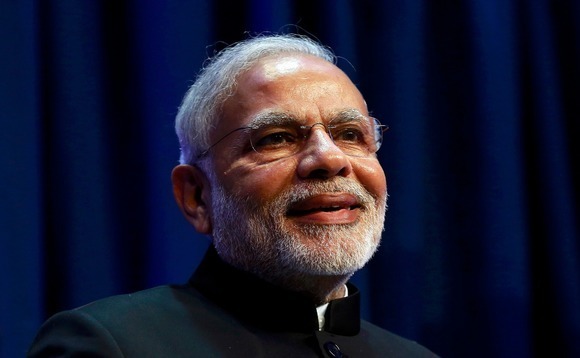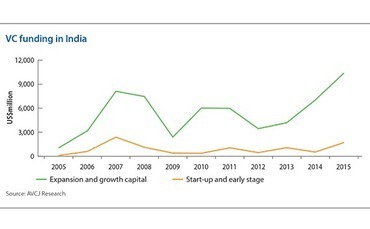
India VC: Smooth waters ahead?

India’s government has made promising signals about its willingness to engage the venture capital community. GPs are optimistic, but reservations remain about the details
When a VC firm sells a stake in one of its portfolio companies, it needs to know there is a reliable regulatory framework in place. However, Ash Lilani, co-founder and managing partner of India's Saama Capital, cannot count on that. At issue are the country's tax laws, which leave buyers confused as to whether any tax will have to be paid, and how it will impact the final transaction.
"About 90% of our deals get stuck at that point. We don't get stuck on price, we get stuck here," says Lilani. "If we can provide clarity on how tax treatment works for investments and exits, then it takes away a lot of the burden on investors."
Clarifying the capital gains burden is just one suggestion that India's VC fund managers have for the government. Recent developments indicate that the government is beginning to listen. Prime Minister Narendra Modi led off the new year by announcing a new INR100 billion ($1.5 billion) VC fund-of-funds; around the same time an advisory panel formed by the Securities and Exchange Board of India (SEBI) submitted a slew of recommendations intended to make it easier for VC and PE funds to do business in India.
Progress is not guaranteed, despite the Modi administration's general support for venture capital and the country's start-up ecosystem. Much depends on the implementation of the proposed measures, and the ability of the government to follow through legislatively. While managers are generally optimistic, they also know that change will not happen overnight.
Taxing issues
The report by SEBI's Alternative Investment Policy Advisory Committee (AIPAC) gives an indication of the shape that regulatory reforms could take. The panel's recommendations focused on promoting India's entrepreneurial environment by creating a more favorable atmosphere for GPs that fund the country's start-ups. AIPAC envisions this taking place primarily through streamlining the tax laws and unlocking domestic capital pools.
The tax recommendations include support for reforms to the capital gains tax that Saama's Lilani complained of. As AIPAC notes, the question of how to categorize profits from exits - as capital gains or as business income - has been the subject of multiple contradictory judicial rulings. The effect is that buyers are never sure if the seller will be tied down by tax investigations in the middle of the sale.
"Buyers of our companies say, ‘Wait a minute, we still have this risk. I agree with what you're saying, that's what the law says, but based on these recent cases, I'm not sure that you won't have to pay tax. So can you take 20% of what I'm giving you and put it in escrow or a withholding, to protect us in the event the government comes after you,'" Lilani explains.
AIPAC also suggests reforming the tax regulations relating to incentive programs such as stock options and employee stock ownership plans (ESOPs).
At the moment these are taxed as income, with tax payable at the time of exercise - meaning that not only do employees exercising their options have to pay a higher rate than regular investors, but they also have to pay tax before they can actually sell the shares. If the share price declines before they are able to sell, employees could end up paying more in taxes than they receive in income. As a result, employees are inclined to devalue these incentive plans and employers are in turn unlikely to offer them.
"What it means is that in India, which is already such a cash-tight economy, people then value cash more, and now companies have to pay a lot more in cash," says Prashant Mehta, a partner at Lightbox Ventures. "And so we've seen that the cost base for an employee has gone up significantly."
As AIPAC was unveiling its regulatory recommendations, the prime minister made his own contribution, announcing several measures aimed at encouraging the development of India's start-up economy. Proposals include reforms to the country's business environment to make things easier for start-up founders. However, the centerpiece of Modi's presentation was the announcement of a INR100 billion ($1.4 billion) fund-of-funds for investments in micro, small, and medium-sized enterprises.
Despite the attention inevitably commanded by the announcement, industry players are divided on the government's ability to fit into India's venture capital ecosystem. At heart of the skepticism is the fact that the government's priorities are not necessarily the same as those of other LPs; while most investors are fundamentally driven by the desire for returns on investments, the government's goal is to grow the economy and stimulate new areas of growth. GPs that take the government as an investor could therefore be pulled in two directions, to an extent.
On the other hand, Karthik Reddy, co-founder and managing partner of early-stage investor Blume Ventures, points out that the government is actually not a newcomer to the VC space. It has been contributing funding to GPs for years on an indirect basis, through institutions such as the Small Industries Development Bank of India (SIDBI) rather than a fund-of-funds. As such, it knows how GPs operate, and is likely to take this into account when making its investment decisions rather than trying to enforce a change in priorities.
"Effectively the GP is going to act in accordance with the interests of 75% of the LPs who are giving them money, not for the benefit of the 25% held by the government," Reddy says. "And if the government perceives a conflict of interest, they shouldn't approve the application."
Early-stage GPs - often overlooked as angel investors and late-stage funds grab most of the attention - also see an opportunity in the announcement; the government's fund-of-funds could provide them with much-needed support. However, several emphasize that the management style of the fund will be important. If it is run in a bureaucratic and cautious manner, eschewing the risks that come with early-stage investing, it may not be as effective as hoped.
Positive vibes
Though GPs are divided on the government's potential as an LP, all welcome the prospect of an improved business environment. Some of Modi's proposals on this score attracted criticism, such as a tax holiday for the first three years of a start-up's life - seen by many as possessing cosmetic value only since most start-ups do not make a profit in the first three years anyway.
Other measures have more support, including plans to make it easier both to start and to end a company. These are currently long and drawn-out processes, requiring large amounts of paperwork, which discourage potential entrepreneurs. While the government has an obligation to protect a company's employees, GPs feel that it should be possible to strike a balance and make the process less painful while still providing workers some protection, thereby encouraging more founders to take the plunge.
Overall, industry players see a lot to be hopeful for in the government's new measures. The emphasis is clearly on encouraging start-ups rather than the VC firms themselves, but the prime minister has also made it clear that he understands the importance of the VC industry to this goal. As for how many of the proposals will be implemented, GPs will have to wait and see.
"The government has made a great step forward," says Lightbox's Mehta. "Now the devil is in the details of how they're going to execute all these deals, and even more important, who are the people they're going to bring on board to execute them."

Latest News
Asian GPs slow implementation of ESG policies - survey
Asia-based private equity firms are assigning more dedicated resources to environment, social, and governance (ESG) programmes, but policy changes have slowed in the past 12 months, in part due to concerns raised internally and by LPs, according to a...
Singapore fintech start-up LXA gets $10m seed round
New Enterprise Associates (NEA) has led a USD 10m seed round for Singapore’s LXA, a financial technology start-up launched by a former Asia senior executive at The Blackstone Group.
India's InCred announces $60m round, claims unicorn status
Indian non-bank lender InCred Financial Services said it has received INR 5bn (USD 60m) at a valuation of at least USD 1bn from unnamed investors including “a global private equity fund.”
Insight leads $50m round for Australia's Roller
Insight Partners has led a USD 50m round for Australia’s Roller, a venue management software provider specializing in family fun parks.







